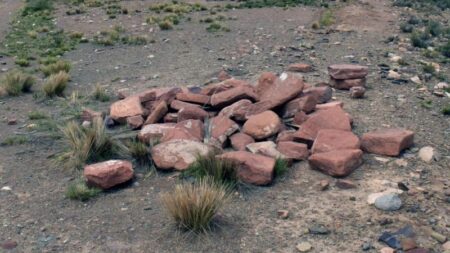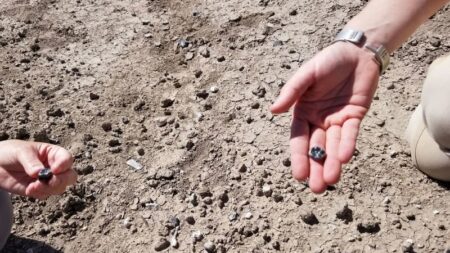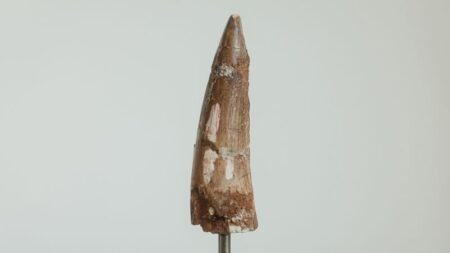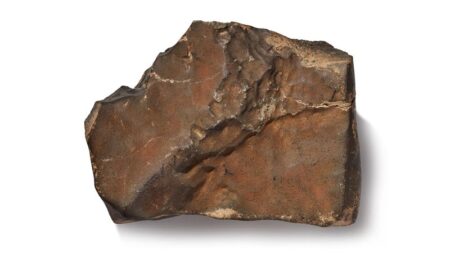Recent advances in paleoproteomics have made remarkable strides, particularly through the recovery of ancient proteins from an exceptionally old fossilized rhinoceros tooth, which is estimated to be 24 million years old. This breakthrough is significant as it represents a new frontier in studying ancient life on Earth. The rhinoceros tooth, discovered in the Canadian Arctic, contains proteins that are ten times older than the oldest known DNA. This research has resulted in the successful analysis of the oldest known detailed protein sequence, marking a vital step in understanding evolutionary history.
Ryan Sinclair Paterson, a postdoctoral researcher at the Globe Institute at the University of Copenhagen and the lead of this research, emphasized the robustness of enamel in fossils, which acts as a protective vault for proteins over extensive geological timescales. By unlocking this “vault,” Paterson and his team have initiated a new exploration into the field of paleoproteomics, potentially providing insights into ancient species that extend far beyond the chronological limits of DNA analysis.
This research was published on July 9 in the prestigious journal Nature, which highlighted the vast potential of examining ancient proteins. Unlike DNA, which tends to degrade quickly, proteins, composed of amino acid sequences, can be more durable and informative regarding a specimen’s evolutionary traits and historical context, including diet and potentially even sex. Enrico Cappellini, a professor at the University of Copenhagen’s Globe Institute and a coauthor of the study, expressed hope that the findings could incorporate future research on dinosaurs if they prove consistent across multiple samples.
Cappellini and Paterson collaborated with their colleagues from the University of York and the Canadian Museum of Nature to extract sequences from seven preserved proteins within the fossilized tooth. This sequencing allowed the research team to trace the evolutionary lineage of the unknown rhino, revealing that it branched off from a common ancestor shared with present-day rhinos around 41 to 25 million years ago.
The study highlights the diverse history of rhinoceros species, which includes striking forms like the woolly rhinoceros and the enigmatic Siberian unicorn. The findings also resonate with a separate but equally vital research effort published in the same issue of Nature that investigated ancient mammals from Kenya’s Turkana Basin, demonstrating the robust potential of biomolecules to endure even in extreme tropical climates.
The Turkana research involved the examination of fossils dated between 1.5 and 18 million years old, and researchers successfully recovered proteins from five of these fossils. These findings shed light on the biochemical remains within warm climates, indicating that the extraction of prehistoric proteins could extend beyond what was previously assumed.
While both studies demonstrated the potential for recovering biomolecules, experts in the field offered opinions on the reliability and implications of these findings. Maarten Dhaenens from the University of Ghent remarked on the soundness of the research on the Canadian fossil while expressing cautious skepticism about the methodology used for the Kenyan findings, emphasizing the need for thorough validation.
Evan Saitta, a paleontologist, noted the surprising nature of discovering preserved proteins in warm tropical environments, challenging previous assumptions that cooler habitats were needed for preservation. He indicated that if the results are replicable, it opens a pathway for further explorations in fossil sites globally.
Despite the excitement surrounding these discoveries, some researchers cautioned against premature assumptions about finding proteins in dinosaur fossils due to their substantial age and historical context. Matthew Collins, a professor at the University of Cambridge, expressed skepticism about the likelihood of retrieving proteins from such old specimens. Yet, both Cappellini and Paterson remain optimistic, suggesting that with continued research, it may eventually be feasible to uncover useful protein information from dinosaur fossils, although they acknowledge other pressing questions in evolutionary history may take precedence in their future investigations.
In summary, the recent research breakthroughs surrounding ancient proteins extracted from fossilized specimens mark a significant advancement in paleontological studies. The exploration of ancient biomolecules provides new, innovative avenues for understanding the evolution and history of various life forms that once roamed our planet, opening the door to potential future discoveries that could reshape our understanding of prehistoric life.












